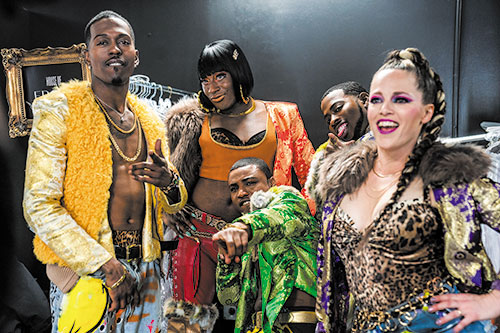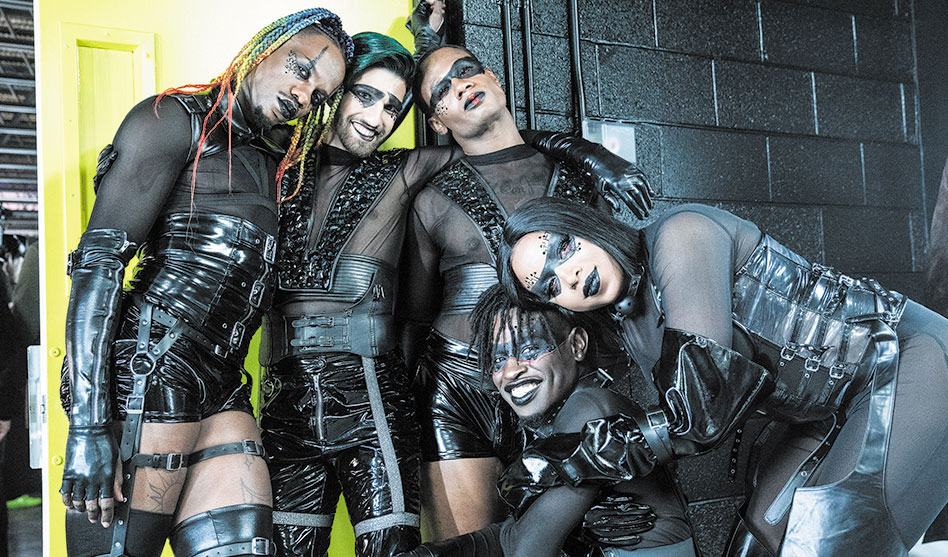Cali Dequan, bottom, was a late addition to House of Balmain’s lineup for ‘Legendary.’
(Photo courtesy Barbara Nitke/HBO Max)
2 houses, both alike in dignity, pit North Texas friends against each other. But they are having a ball
ARNOLD WAYNE JONES | Executive Editor
jones@dallasvoice.com
If you don’t know much about ballroom culture, you may have some idea about it from the FX series Pose, or the iconic 1990 documentary Paris Is Burning, in which “houses” (many named after fashion brands) cultivate talent in the art of vogueing — a mix of dance, glamour, attitude and performance in a competition for bragging rights. It’s traditionally very gay, largely black, often gender-bending and defiantly flamboyant.
Which makes it all the more surprising that when AT&T decided to launch its new streaming service HBO Max (all of the content from the traditional HBO platforms, plus new shows), the original series selected to be the standard-bearer for the network was Legendary, a reality competition series about the world of ballroom. On the series, eight houses go head-to-head each week, with the lowest-performing two houses facing off in a battle for dominance.
Three episodes in, two houses, Ebony and Balmain, have continued to slay, with a member from each — Ebony’s XaPariis and Balmain’s Cali Dequan — bringing Texas realness to the runway.

XaPariis, center, adds drag pageant realness to the world of ballroom. (Photo courtesy Zach Dilgard/HBO Max)
It’s a rare opportunity to take ballroom — with its underground aesthetic even among the gay community — to the masses. And one neither saw coming in their lives.
Certainly not Cali, who for part of last year was homeless. Cali — who likes to say “I was made in Michigan, but Texas made me who I am” — got his start in Dallas in ballroom and went out on his own when he moved to Los Angeles early last year. It wasn’t an easy transition financially or professionally, but he continued to do balls as a “Double-O-Seven” (a freelancer) until he attracted the interest of Jamari, house father of Balmain. They became friends, and Cali was invited to join that house.
At that time, Legendary had already been in development for years — first at Netflix, then at HBO. Cali knew many of his fellow ballers were already cast on the show before he even joined the house. Then the news came this past January: One of the cast members from Balmain didn’t pass a background check.
“It was mind-blowing because [the TV show] has been in development for two years, and I was basically a replacement. I legit signed up two weeks before it was time to start filming.”
XaPariis’ inclusion was almost as unexpected. He knew about the show when it was set for Netflix, but back then most of the houses set for inclusion were L.A.-based, including his “gay dad” as a cast member. When it moved to HBO, “they went in a different direction [with the casting], and then my dad wasn’t able to get clearance from the Navy.” XaPariis and another House of Ebony member, Shorty, were added to the lineup. They all spent two months sequestered in a compound in Connecticut earlier this year, wrapping up filming just as the pandemic hit.
It’s all far from where they thought they would be. XaPariis got his start in Houston, originally as part of the drag pageant circuit. “I don’t even know what made me walk [my first ball],” he says, “but I ended up being in the last battle. And that’s when I knew it was what I wanted to do.”
The pageant circuit, plus his own addiction to watching reality TV, did prepare him for being on Legendary. “There are as many similarities between ballroom and drag as there are differences. Ball culture is so broad — you can create your own lanes,” XaPariis explains, “but in drag pageants, it’s so much easier for you to come up with a game plan. Anybody can be anything, and it’s all about how you do. So much more competition, and it’s so much bigger.”
XaPariis moved to Dallas about three years ago, where he attended United Black Ellument’s Vogue Academy. It was there that another young upstart caught his eye.
“The first day I went to UBE I was looking around the room, and when I saw Cali, I just attached myself. I said ‘Do you want to be my gay child?’” (a kind of queer padewan who learns the ropes from a more senior performer). That relationship continued after both were cast on Legendary.
“I was still his mom [once we got on the show],” XaPariis says. “We would have conversations after tapings so I could make sure he was doing OK.”
For his part, Cali feels less OK now than he did during the competition. He’s torn between his excitement over the launch of the new series and his personal stress over the state of America in a post-George Floyd world.
“It has been hard for me to even post promos about the show on social media, because I feel the weight of the world on my shoulders,” Cali says about the protesting and civil unrest in the name of racial justice. “It’s heavy on the heart, because I understand what’s going on but can’t fathom it. I’m a very spiritual person; I believe everything happens for a reason. Legendary celebrates people of color — ballroom is underground, but is being brought mainstream. As a gay black man, the struggles we face are different than a lot of struggles people who are not black or who are not gay face. But as a person, I am trying to stay as present as I can. HBO has brought our culture to a platform that can be seen across the world.”
XaPariis echoes that optimism. “A lot of people in ballroom are about diversity. What’s going on now [in the streets] will push for equality. When the dust settles, I feel we will be in a better place,” he says.
They feel this way despite some criticism — most originating from the traditional ballroom culture — that the series may be exploitive and not accurately reflect ballroom. Both contestants downplay this opinion.
“The perception from the ballroom culture is that [the series] is not doing its job, but this is a competition show — it won’t be able to capture every aspect right off the bat,” he says. “We are educating people on the [culture] — [this first season is] a manual about what ballroom is to put everyone up to the same speed.”
And as gay men who both present more along the femme side of the spectrum, showing strong, black gay men who have survived despite — or perhaps because of — their situations is empowering.
“The longer we are there, the more they will introduce everyone’s individual story,” Cali says. “I’m anticipating the rest of the show. I feel like my story will be like a testimony of what I have been through in life, and someone else will learn from my struggles. I don’t see my struggles as negatives, but as I continue to grow and live life, I am here to lead by example.”
And that’s how change comes.
Legendary airs Wednesdays on HBO Max.













